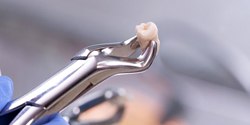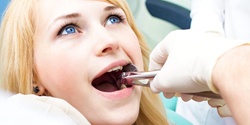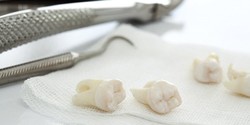Tooth Extractions – Edmond, OK
Comfortable Removal of Troublesome Teeth
The loss of a single tooth, even one that’s not visible, can dramatically impact your oral health. That’s why removing a tooth is almost never our first choice here at Bluff Creek Dental. In some cases, though, performing a tooth extraction is the best option for preserving your oral health as a whole. Rest assured that when you do need tooth extractions, your dentist in Edmond, Dr. Patrick Crowley, will make sure you’re comfortable every step of the way. He’ll examine your smile, determine whether an extraction is necessary, and come up with a personalized treatment plan. If a particular tooth has been giving you trouble, contact us today to discuss your options.
When Is Tooth Extraction Necessary?

Dr. Crowley will do his utmost to help you retain your natural teeth for as long as possible. In the following situations, though, removing a tooth may be the best choice for your overall oral health and function:
- Severe decay or damage has irreparably destroyed a tooth
- To make room in the mouth for orthodontic treatment when teeth are overcrowded
- To ensure the success of a partial or full denture
- When a primary (baby) tooth doesn’t fall out on its own
- When a tooth is impacted (stuck in the gumline and unable to erupt)
- Wisdom teeth, also known as third molars, are often removed due to impaction or crowding
What to Expect During the Tooth Extraction Process

There are generally two ways to remove a tooth: a simple extraction or a surgical extraction in Edmond.
A simple extraction is only possible when the tooth has fully emerged from the gums. First, we numb that area of your mouth. Then, we use a clasping instrument to gently rock the tooth back and forth until it breaks free.
A surgical extraction is necessary when the tooth is impacted. In some cases, this may involve making an incision in the gum tissue to expose more of the tooth. We might also have to break the tooth into smaller sections and remove it piece by piece.
After we closely examine your mouth, we can determine which option is best for you. We’ll also make sure your mouth is completely numb before beginning. We can even provide dental sedation to help you relax and get comfortable at our office near Piedmont.
Caring for Your Smile After a Tooth Extraction

Following your tooth extraction, we’ll provide you with aftercare instructions for the next few days, which may look something like this:
- Take any prescribed pain medication or antibiotics as directed.
- Use cold compresses to minimize pain and swelling.
- Avoid hot or spicy foods while healing.
- Do NOT smoke or drink through a straw, as that could dislodge the blood clot forming at the extraction site.
- Eat only soft foods.
- Call us right away if your pain or bleeding increases after the first two days.
Options for Tooth Replacement

Once you have recovered from your extraction, we can discuss your options for replacing the tooth. Many patients choose a dental bridge, which consists of several dental crowns strung together. This restoration looks natural, but it requires that two healthy teeth be shaved down. Plus, it only replaces the tooth’s crown, not the root.
That’s why we often recommend dental implants instead. These titanium posts are placed in the jawbone and topped with a personalized crown, bridge, or denture. Not only are they versatile enough to bring back any number of teeth, but they often last exponentially longer than bridges.
Understanding the Cost of Tooth Extractions

As much effort as we put into making our procedures entirely stress-free, we also know that it’s unavoidable that some patients will be made nervous by the prospect of the treatment. That’s why we make it a point to make payment easy; in order to give you one less thing to worry about.
We’ll be able to give you a complete estimate for what your care will cost when we meet you in person, but here’s what you should know before then in the interest of budgeting for your treatment.
Factors That Can Affect Tooth Extraction Cost

First of all, it’s important to note that there are a variety of factors that can affect the cost of your tooth extraction in one way or another. For example:
- The type of tooth that you’re having removed and where it’s located in the mouth.
- How many teeth are being extracted.
- The complexity of the tooth extraction. For example, if a tooth is impacted it may be necessary to consult an external specialist to aid with the procedure.
- What you’ll use to replace the tooth you’re missing.
Does Dental Insurance Cover Tooth Extractions?

Tooth extractions are only ever done for important medical reasons, meaning that they’re well within the realm of what most dental plans are willing to cover. That being the case, you can usually expect your insurance to cover at least a portion of the care that you’re going to receive. While the exact rate of care depends a bit on the particulars of your dental plan, you can often expect around 50% of the procedure to be paid for. That said, it’s important to check with your insurance company to make sure that you’re getting the most out of your benefits.
Other Options for Making Tooth Extractions Affordable

That said, we don’t want to make insurance a requirement in order for patients to get the care that they need from us. For that reason, we offer a plethora of financial options that make the services you receive considerably more affordable.
For one, we’re currently offering a special on emergency appointments, so if you’re in pain and think that one of your teeth needs to be extracted, there’s no harm in coming in for an exam.
We also have an in-house membership plan that can serve as an excellent alternative to dental insurance. For an annual fee you can get complementary preventive services, as well as substantial discounts on many of the other services that you’ll receive from us.
If you’re unsure about paying for care all at once, you might be interested in financing services from CareCredit. Patients who qualify can split up the price of their procedure, often with little-to-no additional interest.
If you have questions about any of the financial options available to you, give us a call and we’ll be happy to talk to you about them.
Tooth Extractions FAQs
Do Tooth Extractions Hurt?
Many patients are anxious about committing to necessary dental treatments because they are afraid a procedure will hurt. Dr. Crowley and his team understand this, so we always begin the tooth extraction process by using an appropriate anesthetic to render the procedure painless. We also offer nitrous oxide sedation for those who need extra help staying calm and still. While you can expect soreness and discomfort after the procedure, you can minimize this by adhering to Dr. Crowley’s aftercare instructions to prevent infection and encourage proper healing. However, contact our office if your pain seems to be getting worse or you notice signs of infection like fever, fatigue, chills, or a foul taste in your mouth.
Is There an Alternative to Tooth Extraction?
One of the primary goals of dental medicine is to prevent tooth loss, so you can rest assured that Dr. Crowley does not recommend extractions lightly. However, it is sometimes necessary to remove a troubled tooth to relieve pain and prevent infections in other areas in the mouth. While a decayed tooth can often be saved if it receives a filling or a root canal and gum disease can frequently be addressed with periodontal therapy, you can assume that Dr. Crowley has already eliminated these as viable treatment options if he is recommending extraction.
What Is Recovering After a Tooth Extraction Like?
Dr. Crowley will provide you with a detailed list of aftercare instructions to help you stay comfortable and encourage a smooth and thorough healing process. In the days following your procedure, it’s important to get plenty of rest while protecting the surgical site from damage that can compromise the blood clot sheltering it. If this clot is broken, you will experience a severely painful condition that increase risks of infection called dry socket, so it’s best not to spit or drink through a straw while recovering. About three days after your procedure, you should begin cleaning your mouth by rinsing with a mixture of salt and water while brushing and flossing your teeth daily. It’s also best to refrain from smoking, use a cold compress as needed, change your gauze and take medication as instructed, and stick to a soft diet. While the healing process varies for each patient, you should begin to feel better after about three days.
Can I Smoke After Tooth Extraction?
Tobacco use in any form as well as vaping can inhibit your gums’ ability to heal and fight infection, so it’s important not to smoke for at least five days after tooth extraction. However, it’s even better to abstain from smoking for at least two weeks and ideal to quit completely. If you like, we can help you find resources that may make it easier to quit this frustrating habit.
